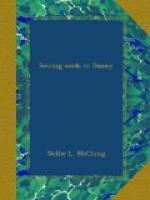With a perfectly serious face Jim unfastened the check, whereupon the horse’s head was lowered at once, and he drank in long gulps the water that had so long mocked him with its nearness.
“Oh, thank you, Mr. Russell,” the Englishman cried delightedly. “Thanks awfully, it is monstrously clever of you to know how to do everything. I wish I could go and live with you. I believe I could learn to farm if I were with you.”
Jim looked at his eager face so cruelly bitten by mosquitoes.
“I’ll tell you, Arthur,” he said smiling, “I haven’t any need for a man to work, but I suppose I might hire you to keep the mosquitoes off the horses. They wouldn’t look at Chiniquy, I am sure, if they could get a nip at you.”
The Englishman looked perplexed.
“You are learning as well as any person could learn,” Jim said kindly. “I think you are doing famously. No person is particularly bright at work entirely new. Don’t be a bit discouraged, old man, you’ll be a rich land-owner some day, proprietor of the A. J. Wemyss Stock Farm, writing letters to the agricultural papers, judge of horses at the fairs, giving lectures at dairy institutes—oh, I think I see you, Arthur!”
“You are chaffing me,” Arthur said smiling.
“Indeed I am not. I am very much in earnest. I have seen more unlikely looking young fellows than you do wonderful things in a short time, and just to help along the good work I am going to show you a few things about taking off harness that may be useful to you when you are president of the Agricultural Society of South Cypress, or some other fortunate municipality.”
Arthur’s face brightened.
“Oh, thank you, Mr. Russell,” he said.
That night Arthur wrote home a letter that would have made an appropriate circular for the Immigration Department to send to prospective settlers.
CHAPTER XIV THE FAITH THAT MOVETH MOUNTAINS
When supper was over and Pearl had washed the heavy white dishes Mrs. Motherwell told her, not unkindly, that she could go to bed. She would sleep in the little room over the kitchen in Polly’s old bed.
“You don’t need no lamp,” she said, “if you hurry. It is light up there.”
Mrs. Motherwell was inclined to think well of Pearl. It was not her soft brown eyes, or her quaint speech that had won Mrs. Motherwell’s heart. It was the way she scraped the frying-pan.
Pearl went up the ladder into the kitchen loft, and found herself in a low, long room, close and stifling, one little window shone light against the western sky and on it innumerable flies buzzed unceasingly. Old boxes, old bags, old baskets looked strange and shadowy in the gathering gloom. The Motherwells did not believe in giving away anything. The Indians who went through the neighbourhood each fall looking for “old clo’” had long ago learned to pass by the big stone house. Indians do not appreciate a strong talk on shiftlessness the way they should, with a vision of a long cold winter ahead of them.




